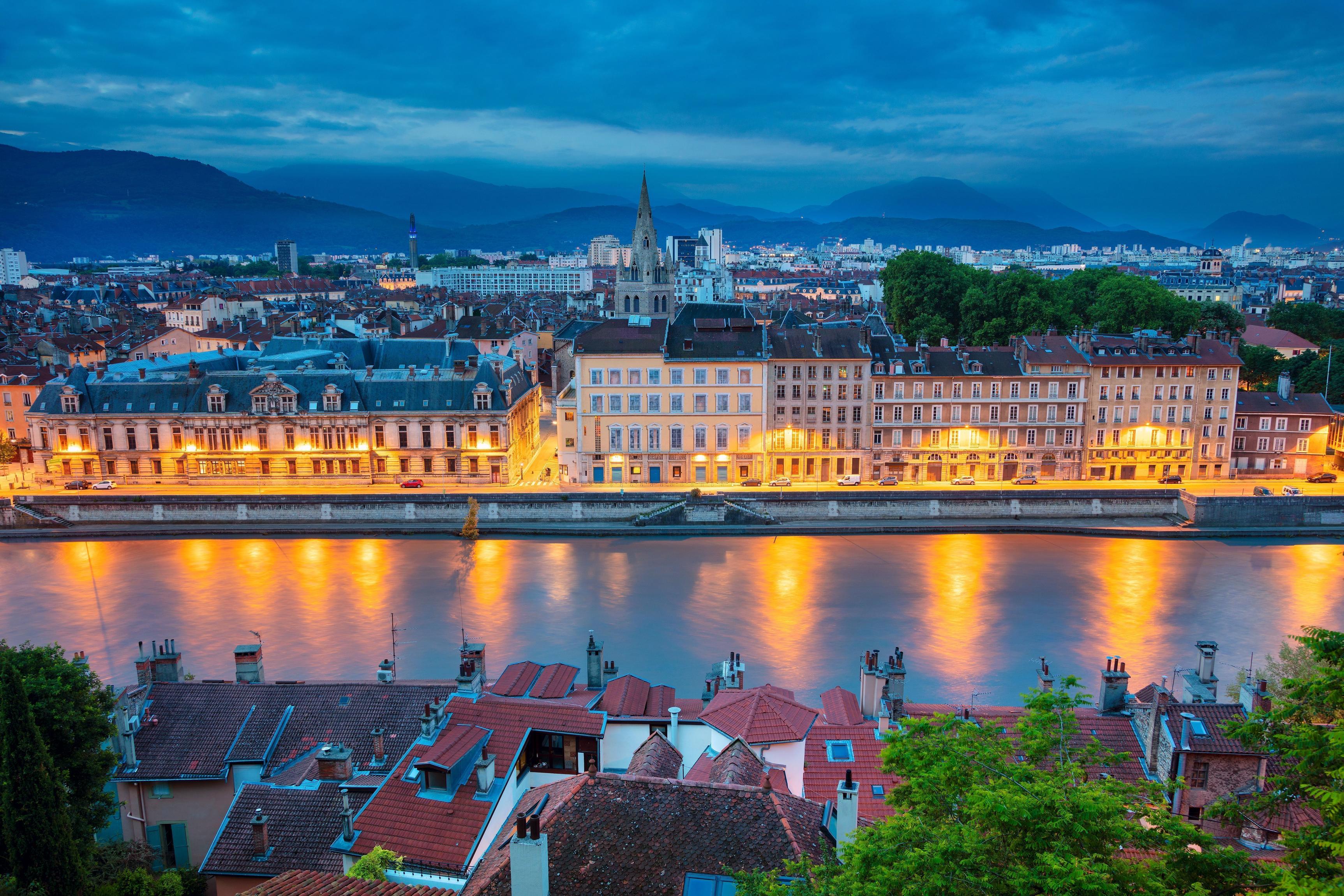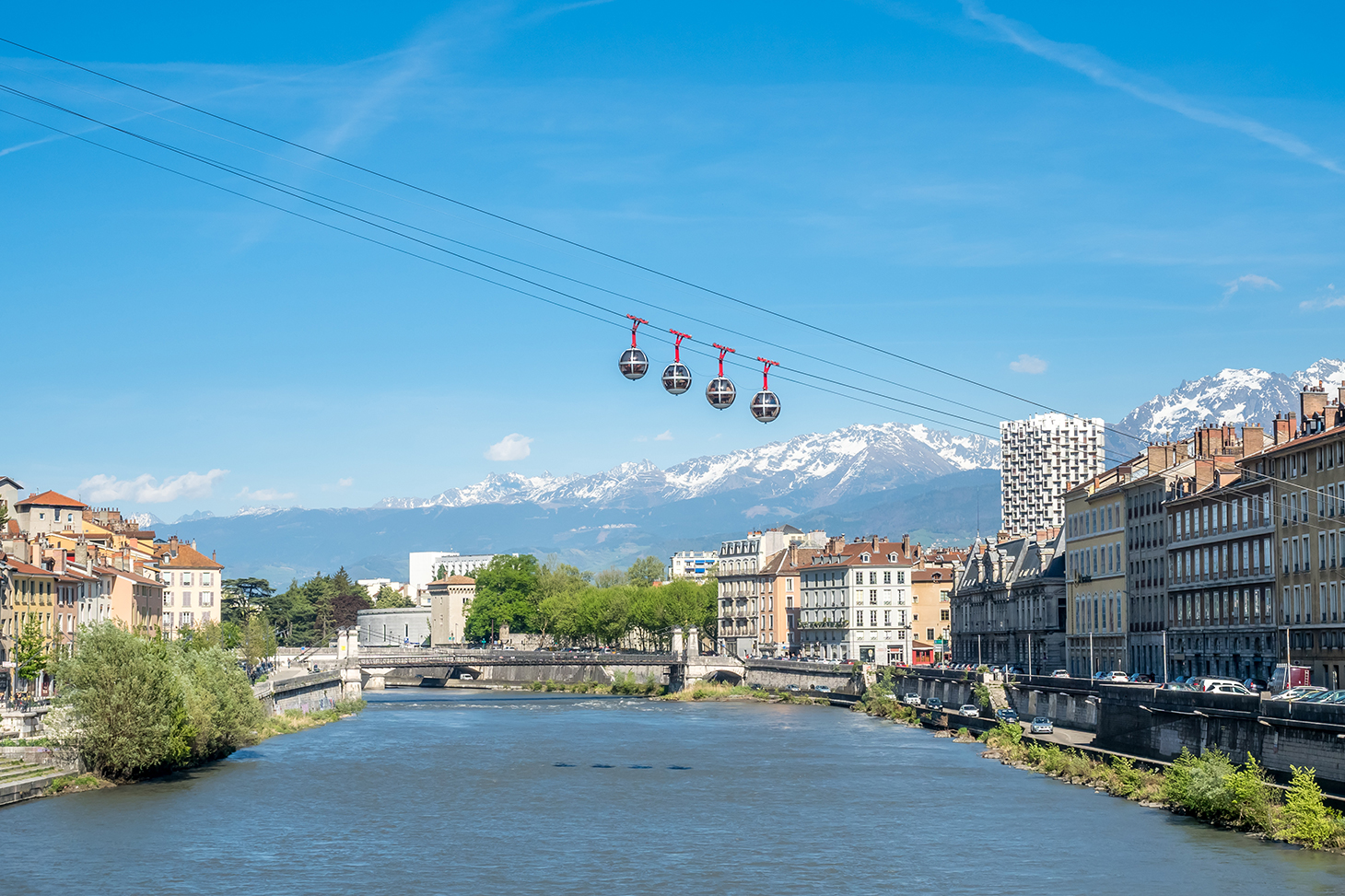Grenoble, a city in the Auvergne-Rhône-Alpes region of southeastern France, sits at the foot of mountains between the Drac and Isère rivers. It's known as a base for winter sports, and for its museums, universities and research centers. Spherical cable cars called “Les Bulles” (Bubbles) connect the town to the summit of La Bastille hill, named for the 18th-century fortress on its slopes.
Grenoble, nestled in the heart of the French Alps, offers a diverse range of experiences throughout the year. The best time to visit depends largely on your interests—whether you’re drawn to outdoor adventures in the mountains or cultural explorations within the city.
Best Time to Visit Grenoble
Spring (March to May)
- Weather & Scenery:
- Enjoy mild temperatures and blooming alpine meadows as the snow melts away.
- The surrounding mountains become a canvas of wildflowers, making it a perfect time for nature walks and gentle hikes.
- Activities:
- Explore the city’s parks and outdoor markets.
- Take day trips into the nearby mountains before the peak tourist season begins.
Summer (June to August)
- Weather & Atmosphere:
- Warm, sunny days and long daylight hours create ideal conditions for outdoor recreation.
- The city buzzes with festivals, outdoor concerts, and sporting events.
- Activities:
- Enjoy hiking, mountain biking, and climbing in the surrounding Alps.
- Explore the city’s vibrant café culture, open-air markets, and local festivals.
Autumn (September to November)
- Weather & Scenery:
- Mild and pleasant weather with a gradual cooling down, perfect for enjoying both urban and natural settings.
- The region is transformed by stunning fall colors, adding a picturesque backdrop to your visit.
- Activities:
- Ideal for leisurely hikes and scenic drives to enjoy the autumn foliage.
- Explore cultural attractions, museums, and local culinary delights with fewer tourists around.
Winter (December to February)
- Weather & Atmosphere:
- Cold, crisp days with the potential for snowfall, creating a true alpine winter wonderland.
- Activities:
- A haven for winter sports enthusiasts: skiing, snowboarding, and snowshoeing are popular in the nearby resorts.
- Enjoy the festive spirit in the city with seasonal markets and cozy cafés after a day in the snow.
Grenoble is well connected by several modes of transportation, making it accessible whether you’re arriving from within France or from abroad. Here’s an overview of your options:
By Air
By Train
- TGV and Regional Trains:
- Direct Connections: High-speed TGV services run from Paris (often around 3.5 hours) and other major French cities directly to Grenoble’s main railway station.
- Local and Regional Services: Once in the region, TER (regional trains) can connect you to Grenoble from nearby towns.
- Rail Station:
- Grenoble Railway Station: Centrally located, it’s well integrated with the city’s public transportation network, making it convenient to reach your final destination within the city.
By Bus/Coach
- Long-Distance Bus Services:
- Operators: Companies such as FlixBus and BlaBlaBus offer affordable routes to Grenoble from various French and European cities.
- Considerations: While buses can be a cost-effective option, the journey may take longer compared to trains.
By Car
- Driving:
- Routes: Grenoble is accessible via major highways. If you’re coming from Lyon or Paris, you can use the A480 and A49 highways or other regional routes (such as the D1086).
- Flexibility: Renting a car gives you the freedom to explore the surrounding alpine region and smaller nearby towns at your own pace.
- Parking:
- In the City: Be aware that driving into Grenoble can be challenging due to narrow streets and limited parking in the city center. Many visitors choose to park at park-and-ride facilities and use public transportation for the rest of their journey.
Local Transportation in Grenoble
- Public Transit:
- Once you’re in Grenoble, the city’s public transportation system—which includes buses and trams—provides a convenient and efficient way to get around.
- Cycling and Walking:
- The compact city center and scenic routes along the surrounding hills and valleys also make walking or renting a bike great options for local exploration.
Top Attractions in Grenoble
-
La Bastille:
- Overview: Perched on a hilltop, La Bastille is the iconic fortress overlooking Grenoble.
- Highlights: Enjoy a scenic ride on the Grenoble-Bastille cable car, take in panoramic views of the city and surrounding mountains, and explore the historic fortifications.
-
Musée de Grenoble:
- Overview: One of France’s premier art museums, renowned for its extensive collection ranging from classical masterpieces to contemporary works.
- Highlights: Discover rotating exhibitions and permanent collections that showcase the evolution of art across centuries.
-
Musée Dauphinois:
- Overview: A museum dedicated to the history, culture, and traditions of the Dauphiné region.
- Highlights: Explore exhibits that detail local heritage, from rural life to the region’s industrial past.
-
Historic City Center:
- Overview: Wander the charming streets of downtown Grenoble, where modern shops and cafés mingle with centuries-old architecture.
- Highlights: Enjoy the vibrant atmosphere in public squares, local markets, and inviting cafés.
-
Parc Paul Mistral:
- Overview: A large urban park offering a green retreat in the heart of the city.
- Highlights: Ideal for leisurely strolls, picnics, and outdoor activities while enjoying views of the surrounding mountains.
Activities to Do in Grenoble
Accommodation in Grenoble
Grenoble offers a range of lodging options to suit every budget and preference:
Food and Restaurants in Grenoble
Grenoble’s culinary landscape reflects its alpine heritage and innovative spirit. Here are some highlights of what to expect:
Local Culture in Grenoble
The culture in Grenoble is as dynamic and diverse as its landscape, influenced by both its alpine setting and its reputation as a hub of science and innovation:
-
Alpine Heritage and Outdoor Lifestyle:
- Mountain Spirit: The proximity to the Alps infuses Grenoble with a love for outdoor activities such as hiking, skiing, and mountain biking. This connection to nature is a central part of local identity.
- Environmental Awareness: The city’s commitment to sustainability and environmental initiatives is reflected in community events and green urban projects, mirroring its close ties to the natural world.
-
Art, Music, and Innovation:
- Vibrant Arts Scene: Grenoble is home to numerous museums (like the Musée de Grenoble) and galleries that showcase both classical masterpieces and contemporary art, blending tradition with modernity.
- Cultural Festivals: Throughout the year, the city hosts festivals celebrating music, film, and the performing arts, creating a lively, creative atmosphere. These events often take place in scenic outdoor settings or historic venues.
- Academic and Scientific Influence: With several universities and research institutions, Grenoble has a youthful, innovative vibe. The city is known as a “science city,” where academic pursuits and technological advancements are celebrated alongside artistic endeavors.
-
Community and Daily Life:
- Local Traditions: Despite its modern outlook, Grenoble remains proud of its heritage. Traditional crafts, local folklore, and time-honored culinary practices continue to play an important role in everyday life.
- Café Culture: Much like other French cities, the local café culture is an essential part of social life. Locals gather in cafés for leisurely conversations, debates, and to simply enjoy the moment—an authentic glimpse into Grenoble’s relaxed yet vibrant lifestyle.



